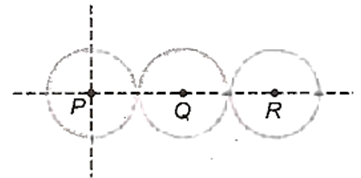 Multiple Choice Questions
Multiple Choice QuestionsA system consists of 3 particles each of mass m located at points (1, 1), (2, 2) and (3, 3). The coordinates of the centre of mass are
(6,6)
(3,3)
(1,1)
(2,2)
A wheel of moment of inertia 2.5 kg-m2 has an initial angular velocity of 40 rads-1. A constant torque of 10 Nm acts on the wheel. The time during which the wheel is accelerated to 60 rads-1 is
4 s
6 s
5 s
2.5 s
A thin circular ring of mass M and radius R rotates about an axis through its centre and perpendicular to its plane, with a constant angular velocity ω. Four small spheres each of mass m (negligible radius) are kept gently to the opposite ends of two mutually perpendicular diameters of the ring. The new angular velocity of the ring will be
4ω
The angular velocity of a wheel increases from 100 rps to 300 rps in 10 s. The number of revolutions made during that time is
600
1500
2000
3000
Three identical spheres, each of mass 3 kg are placed touching each other with their centres lying on a straight line. The centres of the sphere are marked at P, Q and R respectively. The distance of centre of mass of system from P is

The position of a particle is given by and its linear momentum is given by . Then its angular momentum, about the origin is perpendicular to
yz-plane
z-axis
y-axis
x-axis
A sphere of mass m and redius r rolls on a horizontal plane without slipping with the speed u. Now, if it rolls up vertically, the maximum height it would attain will be
If the earth were to contract such that its radius becomes one quarter, without change in its mass, the duration of one full day would be
3 h
1.5 h
6 h
4 h
A stone of mass m tied to a string of length l is rotating along a circular path with constant speed v. The torque on the stone is
mlv
zero
mv2l
The distance between the centres of carbon and oxygen atoms in the carbon monoxide molecule is 1.130 . Locate the centre of mass of the molecule relative to the carbon atom
